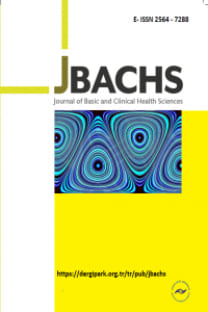Adaptation of Caregivers' Task Scale for Multiple Sclerosis to Turkish Society: Validity and Reliability Study
multiple sclerosis, caregiver, task validity, reliablity,
___
- Aymerich M, Guillamón I, Jovell AJ. Health-related quality of life assessment ın people with multiple sclerosis and their family caregivers:A multicenter study ın catalonia. Patient Preference and Adherence. 2009; 3:311-32. doi: 10.2147/PPA.S6217
- Dunn J. Impact of mobility impairment on the burden of caregiving ın ındividuals with multiple sclerosis. Expert Rev, Pharmaco Economics Outcomes Res. 2014; 10(4):433-440. doi: 10.1586/erp.10.34
- Gupta S, Goren A, Phillips AL, Stewart M. Self-reported burden among caregivers of patients with multiple sclerosis. J MS Care. 2012; 14(4):179-187. doi: 10.7224/1537-2073-14.4.179
- Lorefice L, Mura G, Coni G, Fenu G, Sardu C, Frau J. What do multiple sclerosis patients and their caregivers perceive as unmet needs. BMC Neurology. 2013; 1(13):177. doi: 10.1186/1471-2377-13-177.
- Bassi M, Falautanob M, Cilia S, Goretti B, Grobberio M, Pattini M. The coexistence of well- and ıll-being ın persons with multiple sclerosi: their caregivers and health professionals. Journal of the Neurological Sciences. 2014; 337(12):67–73. doi: 10.1016/j.jns.2013.11.018. Epub 2013 Nov 19.
- Pakenham KI. The nature of caregiving in multiple sclerosis: development of the caregiving tasks in multiple sclerosis scale. Multiple Sclerosis. 2007; 13:929-938. doi: 10.1177/1352458507076973.
- Benito-Leo´n J, Rivera-Navarro J, Guerrero AL, Heras V, Balseiro J, Rodrı´guez E. On behalf of the caregiver quality of life ın multiple sclerosis (careqol-ms) study group: the careqol-MS was a useful instrument to measure caregiver quality of life in multiple sclerosis. Journal of Clinical Epidemiology. 2011; 64(6):675-686. doi: 10.1016/j.jclinepi.2010.08.003
- Buchanan RJ, Huang, C. The need for mental health care among ınformal caregivers assisting people with multiple sclerosis. Int J MS Care. 2013; 15(2):56-64. doi: 10.7224/1537-2073.2012-030
- Opara J, Jaracz K, Brola W. Burden and quality of life in caregivers of persons with multiple sclerosis. Neurol Neurochir Pol. 2012; 46(5):472-9. doi: 10.5114/ninp.2012.31358.
- Buchanan RJ, Radin D, Huang C. Caregiver burden among ınformal caregivers assisting people with multiple sclerosis. Int J MS Care. 2011; 13(2):76–83. doi: 10.7224/1537-2073-13.2.76.
- Güzüm S, Aksayan S. Kültürlerarası ölçek uyarlaması için rehber II: Psikometrik özellikler ve kültürlerarası karşılaştırma. Hemşirelik Araştırma ve Geliştirme Dergisi. 2003; 1:3-14
- Yeşilyurt S, Çapraz C. Ölçek geliştirme çalışmalarında kullanılan kapsam geçerliği için bir yol haritası. Erzincan Üniversitesi Eğitim Fakültesi Dergisi. 2018; 20:251- 264. . doi: 10.17556/erziefd.297741
- Brown TA. Confirmatory factor analysis for applied research. The Gu ilford Press. New York. 2006; USA.
- Karakoç FY, Dönmez L. Ölçek gelı̇ştı̇rme çalışmalarında temel ilkeler. Tıp Eğitimi Dünyası. 2014; 40:39-49. doi: 10.25282/ted.228738
- Türkmen E, Badır A, Balcı S, Akkuş Topçu S. Hemşirelik iş indeksi hemşirelik çalışma ortamını değerlendirme ölçeği'nin Türkçe'ye uyarlanması: güvenilirlik ve geçerlilik çalışması. Hemşirelikte Araştırma Geliştirme Dergisi. 2011; 2:5-20.
- Büyüköztürk Ş. Sosyal Bilimler için veri analizi el kitabı. Ankara: Pegema Yayıncılık. Özdamar, K. Paket Programlar ile İstatistiksel Veri Analizi. Eskişehir, 2004; Kaan Kitabevi.
- Özdamar, K. (2004). Paket programlar ile istatistiksel veri analizi. Eskişehir, Kaan Kitabevi.
- Aslan A, Kırık AM. Sosyal paylaşım ağlarında konum belirleme ölçeğinin geçerlik ve güvenirlik çalışması. Öneri Dergisi, 2013; 10(40):223-231.
- Tekeş B., Hasta D. Özgecilik ölçeği: geçerlik ve güvenilirlik çalışması. Nesne Psikoloji Dergisi (NPD). 2015; 3(6):3-6. doi: 10.7816/nesne-03-06-03
- Yayın Aralığı: 3
- Başlangıç: 2016
- Yayıncı: DOKUZ EYLÜL ÜNİVERSİTESİ
Esra DUĞRAL, Oguzhan Ekrem TURAN, Ahmet Anıl BAŞKURT, Emin Evren ÖZCAN
Nurten ALAN, İlknur BEKTAŞ, Murat BEKTAŞ
Songül KAMIŞLI, Pınar GÜNER, Kadir Mutlu HAYRAN
Dilek YÜKSEL, Bayram YUKSEL, Erkan KALAFAT, Tuncay YÜCE, Doruk Cevdi KATLAN, Acar KOÇ
Ahmet KAR, İsmet ŞAHİN, Bayram ŞAHİN
Bennur KOCA, Aynur UYSAL TORAMAN
Özge AKÇAY, Mukaddes GÜMÜŞTEKİN
Nazlı Büşra CİĞERCİOĞLU, Ezgi ÜNÜVAR, Polen HAZİMLİOGLU, Fırat TAN, Hasan Erkan KILINÇ, Hande GUNEY DENİZ
